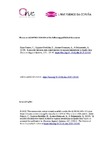Mostrar o rexistro simple do ítem
A scalable decision-tree-based method to explain interactions in dyadic data
| dc.contributor.author | Eiras-Franco, Carlos | |
| dc.contributor.author | Guijarro-Berdiñas, Bertha | |
| dc.contributor.author | Alonso-Betanzos, Amparo | |
| dc.contributor.author | Bahamonde, Antonio | |
| dc.date.accessioned | 2024-04-03T15:21:37Z | |
| dc.date.available | 2024-04-03T15:21:37Z | |
| dc.date.issued | 2019-12 | |
| dc.identifier.citation | Eiras-Franco, C., Guijarro-Berdiñas, B., Alonso-Betanzos, A., & Bahamonde, A. (2019). A scalable decision-tree-based method to explain interactions in dyadic data. Decision Support Systems, 127, 113141. https://doi.org/10.1016/j.dss.2019.113141 | es_ES |
| dc.identifier.issn | 0167-9236 | |
| dc.identifier.issn | 1873-5797 | |
| dc.identifier.uri | http://hdl.handle.net/2183/36058 | |
| dc.description | This version of the article: Eiras-Franco, C., Guijarro-Berdiñas, B., Alonso-Betanzos, A., & Bahamonde, A. (2019). ‘A scalable decision-tree-based method to explain interactions in dyadic data’ has been accepted for publication in: Decision Support Systems, 127, 113141. The Version of Record is available online at https://doi.org/10.1016/j.dss.2019.113141. | es_ES |
| dc.description.abstract | [Abstract]: Gaining relevant insight from a dyadic dataset, which describes interactions between two entities, is an open problem that has sparked the interest of researchers and industry data scientists alike. However, the existing methods have poor explainability, a quality that is becoming essential in certain applications. We describe an explainable and scalable method that, operating on dyadic datasets, obtains an easily interpretable high-level summary of the relationship between entities. To do this, we propose a quality measure, which can be configured to a level that suits the user, that factors in the explainability of the model. We report experiments that confirm better results for the proposed method over alternatives, in terms of both explainability and accuracy. We also analyse the method's capacity to extract relevant actionable information and to handle large datasets. | es_ES |
| dc.description.sponsorship | This research has been supported in part by the Spanish Ministerio de Economía y Competitividad (projects TIN 2015-65069-C2-1-R and 2-R), partially funded by FEDER funds of the EU and by the Xunta de Galicia (projects ED431C 2018/34 and Centro Singular de Investigación de Galicia, accreditation 2016-2019). The authors wish to thank the Fundación Pública Galega Centro Tecnolóxico de Supercomputación de Galicia (CESGA) for the use of their computing resources. We also thank Jorge Díez, Pablo Pérez and Oscar Luaces for providing the data needed to construct the (Outbrain DAY1) dataset and for their assistance in an early stage of this project. | es_ES |
| dc.description.sponsorship | Xunta de Galicia; ED431C 2018/34 | es_ES |
| dc.language.iso | eng | es_ES |
| dc.publisher | Elsevier | es_ES |
| dc.relation | info:eu-repo/grantAgreement/MINECO/Plan Estatal de Investigación Científica y Técnica y de Innovación 2013-2016/TIN2015-65069-C2-1-R/ES/ALGORITMOS ESCALABLES DE APRENDIZAJE COMPUTACIONAL: MAS ALLA DE LA CLASIFICACION Y LA REGRESION | es_ES |
| dc.relation | info:eu-repo/grantAgreement/MINECO/Plan Estatal de Investigación Científica y Técnica y de Innovación 2013-2016/TIN2015-65069-C2-2-R/ES/ALGORITMOS ESCALABLES DE APRENDIZAJE COMPUTACIONAL: MAS ALLA DE LA CLASIFICACION Y LA REGRESION | es_ES |
| dc.relation.uri | https://doi.org/10.1016/j.dss.2019.113141 | es_ES |
| dc.rights | Atribución-NoComercial-SinDerivadas 4.0 Internacional | es_ES |
| dc.rights.uri | http://creativecommons.org/licenses/by-nc-nd/3.0/es/ | * |
| dc.subject | Dyadic data | es_ES |
| dc.subject | Machine learning | es_ES |
| dc.subject | Interpretable machine learning | es_ES |
| dc.subject | Explainable artificial intelligence | es_ES |
| dc.subject | Scalable machine learning | es_ES |
| dc.title | A scalable decision-tree-based method to explain interactions in dyadic data | es_ES |
| dc.type | info:eu-repo/semantics/article | es_ES |
| dc.rights.access | info:eu-repo/semantics/openAccess | es_ES |
| UDC.journalTitle | Decision Support Systems | es_ES |
| UDC.volume | 127 | es_ES |
| UDC.issue | 113141 | es_ES |
| UDC.startPage | 1 | es_ES |
| UDC.endPage | 10 | es_ES |
| dc.identifier.doi | 10.1016/j.dss.2019.113141 |
Ficheiros no ítem
Este ítem aparece na(s) seguinte(s) colección(s)
-
GI-LIDIA - Artigos [63]






